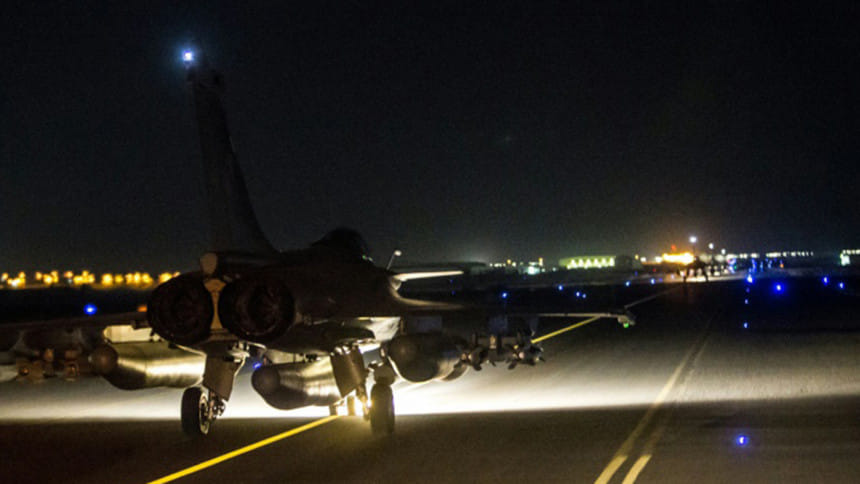France retaliates, bombs Syria after Paris carnage

French warplanes pounded the Islamic State group's de facto capital in Syria on Sunday, in the first such strikes since a wave of coordinated attacks claimed by the jihadists left 129 people dead in Paris.
As the nation prepared to mourn the victims of the carnage in a minute of silence on Monday, a dozen warplanes dropped 20 bombs on IS targets in the Islamists' stronghold of Raqa, signalling the French government's resolve in its fight against the group.
The strike destroyed an IS command post, jihadist recruitment centre, a munitions depot and a "terrorist" training camp, the defence ministry said.
The air raids came after President Francois Hollande called the Paris attacks -- the worst in the country's history -- an "act of war" and vowed to hit back "without mercy".
As the probe into the assault spread across Europe, French police released a photograph of a "dangerous" suspect wanted over the attacks.
The suspect, 26-year-old Salah Abdeslam said to be one of three brothers linked to the attacks, is also wanted by Belgium, which has issued an international arrest warrant for him.
He is believed to be either on the run or one of the gunmen who died during the attacks, security sources said. He lived in the poor immigrant Brussels neighbourhood of Molenbeek, where Belgian police made several arrests in connection with the Paris attacks.
Security sources said the wanted man's brother, 31-year-old Brahim Abdeslam, blew himself up outside a cafe on Boulevard Voltaire in eastern Paris, while the third brother is believed to be among seven people detained in Belgium.
Six other gunmen wearing suicide belts died during the attacks in the French capital -- three at the Stade de France stadium and three at the Bataclan concert hall, the scene of the worst bloodshed.
The sports minister said at least one of the bombers who detonated their explosives near the stadium had tried to enter the venue where France were playing Germany in an international football match at the time.
As night fell over the jittery French capital on Sunday, crowds shocked by the brutality of the killings packed into the Notre-Dame cathedral to mourn the dead.
Prosecutors say they believe three groups of attackers were involved in the carnage, and they do not rule out that one or more assailants may still be at large.
It is now known that three of the suicide bombers were French nationals, two of whom lived in the Belgian capital Brussels.
In a further sign of the growing Belgian connection to the attacks, investigators said two cars used in the violence were hired in Belgium.
One was found near the Bataclan venue, and the other in the suburb of Montreuil east of Paris, with a number of AK47 rifles inside.
Witnesses said the second car, a black Seat, was used by gunmen who shot dozens of people in bars and restaurants in the hip Canal St Martin area of Paris.
PARIS IN MOURNING
Paris residents struggled to come to terms with the latest atrocities, 10 months after jihadists hit satirical magazine Charlie Hebdo and a Jewish supermarket.
Museums and parks were closed and Sunday markets empty, although thousands still flocked to lay flowers and light candles at the sites of the violence.
But in a sign of just how shaken people were, the sound of fire-crackers at Place de la Republique, where mourners were standing in quiet solidarity, sent scores fleeing in panic before they realised it was a false alarm.
"We need to get out, you shouldn't stay at home," 38-year-old Herve told AFP. "You need to go out and look, get a feel for yourself of what happened."
The Islamic State group said they carried out the attacks in revenge for French air strikes in Syria and threatened further violence in France "as long as it continues its Crusader campaign".
World leaders united Sunday to denounce terrorism at a heavily-guarded G20 summit in Turkey and observed a minute's silence in respect of those who were killed.
"We stand in solidarity with France in hunting down the perpetrators of this crime and bringing them to justice," US President Barack Obama said after talks with his host, Turkish President Recep Tayyip Erdogan.
Russia's Vladimir Putin said overcoming global terror was possible only "if all the international community unites its efforts".

 For all latest news, follow The Daily Star's Google News channel.
For all latest news, follow The Daily Star's Google News channel. 



Comments